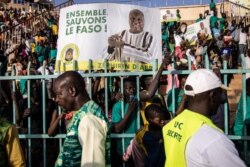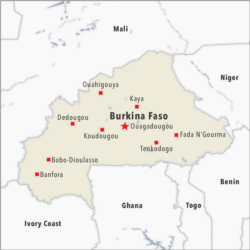Worsening security dominates the list of concerns in Burkina Faso, where voters will go to the polls Sunday to elect a president and national legislators.
Militant Islamist insurgencies and internal ethnic conflicts plague the West African nation of nearly 21 million, displacing more than 1 million and killing at least 1,600 Burkinabè since 2015.
Among the dead are at least 14 Burkina soldiers killed when suspected jihadists ambushed a military convoy November 11 in the northern province of Oudalan, near the borders with Mali and Niger, Reuters news service reported the government’s information minister as saying.
Of the displaced Burkinabè, more than 400,000 will be unable to vote because they have lost identification papers or were unable to register. The Independent Electoral Commission said it could not register prospective voters in roughly 1,500 villages because of insecurity but said residents could travel elsewhere in the country to register and vote.
Extremist groups’ efforts to fan ethnic conflict also “have frayed Burkina Faso’s long-cherished sense of national unity,” the U.S.-based Africa Center for Strategic Studies reports. “The ineffective and at times heavy-handed response of security forces, which had not previously faced a serious security threat, has made leadership in the combating of militant groups an overriding concern for voters.”
Who’s running?
President Roch Marc Kaboré, who took office in December 2015 and is seeking a second five-year term, has pledged that his ruling People’s Party Movement for Progress will continue fighting terrorism.
Zephirin Diabré, one of 12 other candidates, has accused Kaboré of overreliance on warfare.
"Military action alone has never been able to defeat terrorism in any part of the world,” said Diabré, a former finance minister who represents the Union for Progress and Reform Party.
Another leading challenger in what is expected to be a tight race is Eddie Komboïgo of the Congress for Democracy and Progress Party.
“All the candidates put security as the key priority on their platforms,” Siaka Coulibaly, a Burkinabè lawyer and political analyst with the Center for Public Policy Monitoring by Citizens, told VOA. “Some are proposing to strengthen the army. Some are proposing more social aid to help fight the causes of insecurity. And a few are proposing negotiations with militant groups.”
The contenders include one woman — Monique Yeli Kam, head of the Movement for the Renaissance of Burkina Faso (MRF) Party. She sees poverty as another critical election issue, one that also cripples the ability of women to seek elected office.
“Women are the most vulnerable to poverty,” she told VOA, and most “do not have the necessary financial capacity.”
Kam, a businesswoman, said she paid the filing fee equivalent to $45,000 using her own funds, which “could have been used to better organize my electoral campaign.”
Aminata Sanogo, a street vendor in Bobo-Dioulasso, expressed a general cynicism about those running for office.
“This campaign, I am not paying attention to the candidates,” she said. “They have never followed through with their promises.”
Potential regional impact
The insurgent attacks are fueling growing instability in the Sahel region, where security forces from West Africa, France and the United States have been combating the terrorist insurgency since 2013.
That insecurity has strained food resources in the Central Sahel border region between Burkina Faso, Mali and Niger, which the World Food Program describes as “the epicenter of one of the world’s fastest-growing humanitarian crises.”
More than 10,000 people in parts of northern Burkina Faso are “one step short of famine,” Chris Nikoi, WFP’s regional director for West Africa, said in a mid-October plea for humanitarian access to vulnerable communities there.
At a U.N. Security Council briefing Monday on the Sahel, U.S. diplomat Richard Mills noted that the United States in September had earmarked $152 million in humanitarian aid to the Sahel countries of Burkina Faso, Chad, Mali, Mauritania and Niger. That amount builds on a $61 million appropriation for foreign aid to Burkina Faso in 2020, supporting health initiatives, military training, democracy-building and other efforts toward stabilization, as well as a $111 million contribution to the Joint Force.
Mills, the U.S. deputy permanent representative to the United Nations, called upon Burkina Faso to conduct free and fair elections. He also said the United States expected the Burkinabè government to conduct “a full investigation” into five alleged cases of human rights violations by the G-5 battalion operating in northern Burkina Faso earlier this year.
This report originated in VOA’s Africa Division. Alidou Ouedraogo reported from Bobo-Dioulasso, Burkina Faso, for the Bambara Service. Its chief, Bagassi Koura, contributed from Washington, as did Nathalie Barge of the French Service. Henry Wilkins also provided information.







